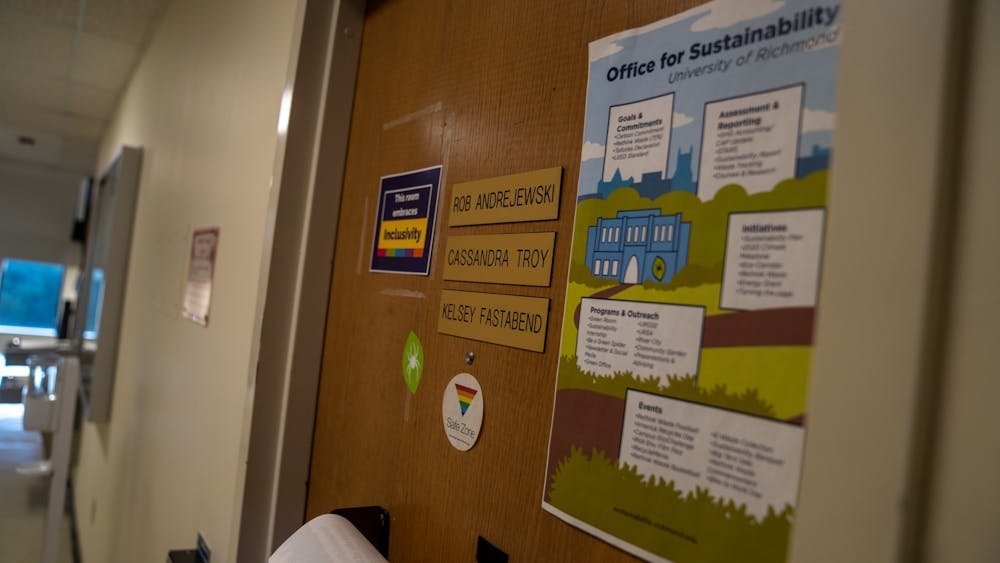This semester, the first thing University of Richmond students see when entering the white tent by the Heilman Dining Center is a table covered in “Every Day is Earth Day” stickers, along with metal straws and a poster informing students what is and is not compostable.
The table is staffed by members from the Office for Sustainability ready to inform anyone who passes by about UR’s new composting initiative. As much as one-third of the waste that currently goes to the landfill on campus is compostable, according to UR’s website.
The composting initiative is helping UR shrink that statistic.
As part of the composting initiative, the Office for Sustainability has partnered with local company Natural Organic Process Enterprises (NOPE) to collect food waste from UR two to three times a week. NOPE works with companies and institutions throughout central and eastern Virginia to develop food scrap and organics recycling programs. It helps UR transport organic waste to a proper Virginia Department of Environmental Quality-permitted composting facility.
“When food waste and compostable materials go to a composting facility, these items are converted to a healthy soil amendment through a process that mimics nature,” according to UR’s website. “Composting cycles organic waste back into our food system, rather than allowing it to sit in a hole in the ground.”
UR’s composting initiative was first implemented at the end of last semester, via composting bins in the Forum by the dining hall, and has expanded this semester with an added Organic Krush composting location. But members of the Office of Sustainability do not want to stop there.
“The long-term goal is to have composting everywhere at every dining location on campus,” said junior Suraya Souidi, a Rethink Waste intern for the Office for Sustainability. “Hopefully we can have that implemented by the end of the semester.”
Spreading the initiative school-wide is challenging because there are different dining materials, such as food packaging and utensils, at each location, meaning that different locations have different compostable items, Souidi said.
For example, every item a student purchasing food receives at Organic Krush, aside from the student’s receipt, can be composted, but at the Heilman Dining Center, only the food, cardboard boxes and napkins can be composted, Souidi said.
To clear up confusion, the Office for Sustainability created the position of Compost Coordinator this semester.
“[Coordinators] ask if students have any questions about composting, and pretty much just tell them what can be composted, and ask them to take part,” said senior Mary Berner, a compost coordinator.
The goal of the coordinators is to educate students about what is compostable at the dining hall and Organic Krush, before the Office for Sustainability adds other composting locations, Berner said.
Enjoy what you're reading?
Signup for our newsletter
However, the compost coordinators may not be reaching all students.
“A lot of time, I feel it’s the same people coming [to the Forum table], so I feel like they are already becoming familiar with what to compost,” junior Hailey Bushnell, a compost coordinator, said.
Although UR’s composting initiative began fairly recently, it has been a work-in-progress for about a year, Souidi said.
Last spring, two seniors who worked for the Office for Sustainability received hundreds of signatures on a petition to implement composting on campus.
UR’s administration agreed to the demands of the petition, in hopes of achieving the goals detailed in its Sustainability Plan, which was created in 2019. The composting initiative is helping UR work toward its goal of diverting 75% of materials from the landfill by 2025, according to UR’s website.
The composting initiative is already seeing results. In January, the initiative collected 6.38 tons of waste, four tons more than in December, Bushnell said.
There has also been a positive reaction from some students.
“It’s really crazy how many people are actually interested and want to learn more about [composting],” Souidi said. “And students have honestly been pushing for more [sustainability], which is really great too.”
Souidi noted the importance of student engagement in getting the initiative started.
“This whole thing was basically started because of student interest,” she said. “From an administrative standpoint, it is hard pushing initiatives without student support.
“So, if you want change, say it. The university will listen.”
Contact contributor Kayla Somers at kayla.somers@richmond.edu.
Support independent student media
You can make a tax-deductible donation by clicking the button below, which takes you to our secure PayPal account. The page is set up to receive contributions in whatever amount you designate. We look forward to using the money we raise to further our mission of providing honest and accurate information to students, faculty, staff, alumni and others in the general public.
Donate Now



